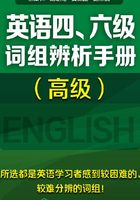
34 at table; dine in; dine on; dine out; dine out on; at the table; eat away; eat off; eat up; wolf down; dine off; finish off; finish up
● 以上词组一般表“吃”,注意它们的差别。
● at table表“在进餐”,table前可有(the) breakfast, (the) supper等,但不可有冠词和其他词语。at the table表“在桌子旁”。如:They like to talk at table.(他们喜欢在吃饭时谈论。)The child was told by his mother not to talk at table.(孩子的母亲告诉他吃饭时不要讲话。)The whole family were at the supper table when I called.(我拜访时,他们全家人正在用晚餐。)Please give your application to the woman sitting at the table.(请你把申请表交给坐在桌子旁边的那位妇女。)
● dine off中介词off后接某具体食物,侧重指吃某食物为正餐。dine off和dine on多用于主动形式。如:He’s been dining off his brother for weeks.(他在兄弟家白吃了好几个星期。)I wish I could afford to dine off fresh meat every day.(我要是每天正餐都能吃上新鲜肉该多好啊。)They dined off breed and noodles.(他们吃面包和面作正餐。)When he could afford it, he used to dine off half a chicken and salad, washed down with wine.(以前当他有钱买得起时,正餐常常吃半只鸡、沙拉还有葡萄酒。)
● dine on中介词on后也接具体食物,不过不一定是正餐,如果是正餐,当然可以与dine off互换。如:He dine elegantly on truffled goose livers.(他风雅地吃了一顿麦蕈鹅肝。)How pleasant it is to dine on fine well-cooked fish and fresh vegetables, in such charming surroundings?(在这优美的环境里吃着做得十分可口的鱼和新鲜蔬菜实在太惬意了。)They dine on [off] fish and eggs.(他们那顿饭吃了鱼和蛋。)My mother dined on [off] sprite and bread.(我妈妈在吃饭时只喝了点雪碧,吃了点面包。)
● dine in指在家进餐;dine out指外出进餐;dine out on指靠声望或成就被人请吃饭。如:Are they dining in tonight?(今晚他们在家里用正餐吗?)My meeting has been cancelled, I’ll be dining in after all.(我的会议取消了,所以我还是能回家吃正餐的。)We dined in last night to celebrate my birthday.(我们昨晚在家吃饭,庆祝我的生日。)The couple will dine out tonight.(这对夫妇今晚在外面吃饭。)I’ve received an invitation to dine out today.(我今天接到赴宴的邀请。)Don’t prepare anything for me tonight; I’ll be dining out.(今晚不要为我准备吃的了,我要在外面吃。)My wife doesn’t enjoy parties or dining out.(我夫人不喜欢聚会,也不喜欢在外面吃饭。)Jones used to dine out on his popularity as a poet.(琼斯过去常靠着他诗人的名望被人请出去吃饭。)
● eat away是动副型词组,多指“尽情地吃”,动物作主语时则意为啃坏某物,eat是及物动词,多用主动语态。如:The children are in the kitchen, eating away as usual.(孩子们在厨房里像往常一样,吃个没完。)They have been eating away for about two hours.(他们一直吃了快两个小时了。)Wood worms had eaten away at the door frame.(蛀虫已把门框咬坏。)Rust was eating away the pipe.(铁锈把管子锈蚀了。)
● eat off是动介型词组,意为“吃掉”“吃光”,一般用主动形式。如:The boy spat out the pill after eating off its sugar coating.(这男孩吃掉药丸上的糖衣后吐掉药片。)Farmers there used to eat off the coleseed with sheep so as to make them fit for the butcher.(那里的农民从前总是放羊吃掉地里的油菜,给羊催膘以备屠宰。)We can all eat off this large duck for two days.(这只大鸭子,我们大家可以吃两天。)The lice have sucked the horse’s blood and eaten off its hair.(虱子吮吸马的血,吃掉了马的毛发。)
● eat up意为“吃完”,一点不剩。少用被动语态。如:Eat up your vegetables, there’s a good girl.(把菜都吃光,真是个乖妞妞。)There is plenty for everyone, eat up. (够大伙吃的,尽管吃。)The expenses ate up our savings. (开支花光了我们的存款。)The locusts soon ate up the crops. (蝗虫把庄稼都啃光了。)
● finish off和finish up也表示“吃光”“喝光”,可以互换,后可用with加食物名称,少用被动语态。如:Those girls soon finished off [up] the whole cake.(那些女孩很快把整块蛋糕吃完了。)That little boy finished off [up] the big pie.(那个小男孩把大馅饼吃光了。)The lumberjacks finished up [off] with a great stack of pancakes.(伐木工人吃了很多煎饼。)Let’s finish off [up] with some of that excellent cheese.(咱们把这些高级奶酪吃光吧。)
● wolf down中down为副词,词组意为“狼吞虎咽地吃”,多用主动形式。如:You should see the way those girls wolfed down the meal, as if they hadn’t eaten for a year.(你看看那些女孩狼吞虎咽的样子,好像她们一年都没吃东西似的。)After working in the fields since daybreak, the haying farmers wolfed down a large noon dinner.(从黎明起就在田间割草的农民饱食了一顿丰盛的午餐。)The children soon wolfed down that banana pie.(孩子们很快便狼吞虎咽地吃香蕉派。)You should have seen them wolf down meat pies.(你要是看见了他们狼吞虎咽吃肉饼的样子,那才叫有意思呢。)